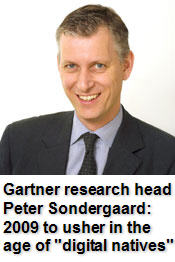Gartner: Ability to leverage consumerization of IT will make or break businesses


Sondergaard went on to describe how consumer technologies and configurations now rival and often exceed in the prowess of the corresponding technologies found in the organizations that are used to serving consumers on their terms ("their" being the organizational side). "Consumers are rapidly creating personal IT architectures capable of running corporate style IT architectures" said Sondergaard. "They have faster processors, more storage, and more bandwidth. In 2012, expect consumer technologies to be fully incorporated and integrated into all settings (eg: home offices, remote offices, in transit, etc.).
According to Sondergaard, consumers will have the capabilty and the tools to determine the final configurations of their application and services as often as IT does. I'm pretty sure he was referring to the configurations of the applications that are normally under the control of the organizations (eg: financial services) that deliver them. No doubt, one of the contributors to this trend is the disassembly of the current crop of applications into descreet software-as-a-service components that end-users can then recomposite into their own user experiences.
In terms of how to get IT to embrace these trends (with an eye on business growth) rather than resisting them (either consciously or subconsciously), Sondergaard went on to describe what is best characterized as a generation gap. Songergaard sees the graduating class of 2009 as containing the first wave of what will be a fully digital generation: a generation of "digital natives" that are so fully immersed in digital culture that they are completely unconcerned about the effects of their technology choices on external entitites (eg: the organizations that serve them). In contrast (to digital natives), Sondergaard categorized most of the conference attendees as "digital immigrants" that struggle to speak the language of the digital natives. Judging by the laughs that comment drew from the audience, there weren't many here who disagreed.
The advice? Don't waste time recruiting some digital natives. "Leverage their understanding and usage models" said Sondergaard. "It will drive a consumption model of services that's radically different from what most organizations have today."
In preparing for this new world where the consumer is in charge, Sondergaard advised:
- Stay keenly aware of the behavioral changes of consumers: Individuals are becoming more sophisticated and more capable of managing applications and work environments. But they must take more responsibility for their interactions and their service providers, including taking more control, absorbing more risk, and even doing more of the work themselves.
- Look at capabilities: The consumer and home computing environments must become robust. That is, the environment must be secure, controlled, managed, reliable, agile, auditable, and high performing.
- Explore where the first mover advantage will happen: There must be competitive moves toward supporting this environment by a significant market player - or market maker - in a significant industry or market space.
- Regarding economics: The economics must be defined. The economics are clearly a two-way street between consumer and business. The consumer clearly gains new power, personalization and control. Business will gain efficiencies as they perform less work and provide fewer infrastructure resources, while their consumers do more of their own work and share more responsibility for outcomes.
Sondergaard wrapped by saying that "By 2009, organizations will be required to deliver scaled-down versions of content, applications, and value-added services to selected customers' personal, virtual, or home computing environments."
Amen to that. Just fix the delivery of the services I use (eg: eBay) for consumption on my mobile devices, and I'll be happy.